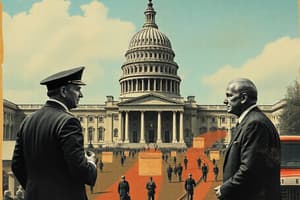Podcast
Questions and Answers
What was a significant outcome of the IATF ceding decision-making powers during the COVID-19 pandemic in the Philippines?
What was a significant outcome of the IATF ceding decision-making powers during the COVID-19 pandemic in the Philippines?
- Strengthened relationships between national and local governments.
- Increased efficiency in national agency responses.
- A unified national response was successfully achieved.
- Local Government Units (LGUs) had to compensate for inefficiencies. (correct)
Which factor contributed to the effectiveness of some local government units during the pandemic?
Which factor contributed to the effectiveness of some local government units during the pandemic?
- Failure to manage resources effectively.
- Reliance on national directives.
- High levels of corruption.
- Strong partnerships with civil society. (correct)
What structural deficiencies affected subnational public health responses during the COVID-19 pandemic in the Philippines?
What structural deficiencies affected subnational public health responses during the COVID-19 pandemic in the Philippines?
- Clear direction from the national government.
- Overabundance of resources and managerial skills.
- Strong patronage politics and effective leadership.
- Limited resources and ineffective management. (correct)
What model of governance is suggested by Francesco Kjellberg as a replacement for the autonomous local government model?
What model of governance is suggested by Francesco Kjellberg as a replacement for the autonomous local government model?
How did President Duterte's leadership style impact the response to the pandemic?
How did President Duterte's leadership style impact the response to the pandemic?
What was the primary focus of traditional institutionalism in political science?
What was the primary focus of traditional institutionalism in political science?
Which characteristic is NOT associated with traditional institutionalism?
Which characteristic is NOT associated with traditional institutionalism?
What was a key criticism that led to the emergence of new institutionalisms in the 1990s?
What was a key criticism that led to the emergence of new institutionalisms in the 1990s?
In the context of sociological institutionalism, how is agency primarily described?
In the context of sociological institutionalism, how is agency primarily described?
According to Samuel Huntington’s view, political development can be defined as what?
According to Samuel Huntington’s view, political development can be defined as what?
What does sociological institutionalism emphasize about institutions?
What does sociological institutionalism emphasize about institutions?
Which of the following best describes the legalist aspect of traditional institutionalism?
Which of the following best describes the legalist aspect of traditional institutionalism?
What is meant by the term 'institutionalization' as defined by Kamrava?
What is meant by the term 'institutionalization' as defined by Kamrava?
What is one of the main purposes of institutions as stated in the content?
What is one of the main purposes of institutions as stated in the content?
How do political institutions influence actors’ behavior according to normative institutionalism?
How do political institutions influence actors’ behavior according to normative institutionalism?
Which statement best reflects historical institutionalism?
Which statement best reflects historical institutionalism?
What aspect of institutions does rational choice institutionalism emphasize?
What aspect of institutions does rational choice institutionalism emphasize?
According to the content, how do institutions provide a cultural infrastructure in society?
According to the content, how do institutions provide a cultural infrastructure in society?
What is a core feature of the 'new institutionalisms' mentioned?
What is a core feature of the 'new institutionalisms' mentioned?
How do institutions engage in the process of shaping societal interactions?
How do institutions engage in the process of shaping societal interactions?
What essential aspect does rational choice institutionalism provide to individuals within institutions?
What essential aspect does rational choice institutionalism provide to individuals within institutions?
What is the main characteristic of the autonomous model of governance?
What is the main characteristic of the autonomous model of governance?
What concept does Kjellberg propose as essential for advancing national goals?
What concept does Kjellberg propose as essential for advancing national goals?
How does Mann define despotic power?
How does Mann define despotic power?
What is the key focus of infrastructural power as described by Mann?
What is the key focus of infrastructural power as described by Mann?
What challenge does the bureaucracy in the Philippines face historically?
What challenge does the bureaucracy in the Philippines face historically?
What impacts the integrity of the Philippine bureaucracy significantly?
What impacts the integrity of the Philippine bureaucracy significantly?
What connection exists between central steering and patronage in the Philippines?
What connection exists between central steering and patronage in the Philippines?
What can be inferred about the relationship between national goals and local authority functions?
What can be inferred about the relationship between national goals and local authority functions?
What was one significant effect of COVID-19 on President Duterte's governance?
What was one significant effect of COVID-19 on President Duterte's governance?
What does the term 'Weak Steering' in the context of pandemic response refer to?
What does the term 'Weak Steering' in the context of pandemic response refer to?
What measures were taken against local governments during the pandemic?
What measures were taken against local governments during the pandemic?
What is needed to build more effective local government units according to the recommendations?
What is needed to build more effective local government units according to the recommendations?
Which of the following was a consequence of the security-focused approach to the pandemic?
Which of the following was a consequence of the security-focused approach to the pandemic?
Study Notes
Institutionalism
- Was the dominant paradigm in political science until the 1950s.
- Traditional institutionalism focused on comparing political systems through analysis of their institutions.
- The 1990s saw a resurgence of institutionalism, with the emergence of "new institutionalisms".
Traditional Institutionalism
- Focused on "good government" (normative).
- Emphasized the influence of formal structures on political behavior (structuralist).
- Acknowledged the importance of history in shaping political systems (historicist).
- Highlighted the role of laws, particularly constitutions, in governance (legalist).
- Aimed at describing and comparing whole systems of government (holistic).
Interregnum
- Samuel Huntington viewed political development as the institutionalization of political organizations and procedures.
- Huntington defined political development as the establishment of stable, valued, and recurring patterns of behaviour.
New Institutionalisms
- Emerged as responses to the limitations of behavioralism and rational choice theory (RCT).
Sociological Institutionalism
- Institutions shape the actions of actors within a specific organizational context by providing constraints and opportunities.
- The process of institutionalization is about perception, not evaluation, and is heavily influenced by cultural norms, conventions, and cognitive frames of reference.
- Three key principles of sociological institutionalism:
- Human agency is context-dependent and influenced by cultural logics.
- These contexts are often heavily institutionalized, spreading their influence beyond their original fields.
- Institutions operate at a subconscious level, providing a taken-for-granted cultural infrastructure in society.
Rational Choice Institutionalism
- Institutions shape behavior by influencing the "structure of a situation", where actors select strategies to pursue their preferences.
- Institutions provide information about the likely future behavior of others and the incentives/disincentives associated with different courses of action.
- Institutions are human constructions designed to solve collective action problems.
Historical Institutionalism
- Explores how state structures reflect and reinforce power relationships between different social and economic groups.
- Emphasizes that institutional development does not always follow a functional logic.
- Explains institutional organization's influence on privileging certain interests while marginalizing others.
- Focuses on how institutional change occurs when power relations shift.
Normative Institutionalism
- Political institutions shape actors' values, norms, interests, identities, and beliefs.
- Institutions simplify political life by establishing certain taken-for-granted assumptions.
New Institutionalism: Core Features
- "New" refers to the focus on:
- Defining institutions.
- Providing systematic explanations for how institutions affect behaviour.
- Understanding the persistence and change of institutions.
Institutions
- Defined as durable social rules and procedures, both formal and informal, that structure (but do not determine) social, economic, and political relations.
The Philippines and COVID-19
- The national government's weak capacity and reliance on local government units (LGUs) led to inconsistent pandemic responses across the country.
- Notable LGUs with larger resources, good coordination with national agencies, better administrative capacity, and civil society partnerships were exceptions to the norm.
- Subnational pandemic responses were hampered by:
- Unclear direction from the national government.
- Limited resources, poor management skills, patronage politics, corruption, and other problems.
Fukuyama's Elements for Effective Pandemic Response
- Competent states, skillful leadership, and a government that is trusted and listened to.
Duterte's Securitized Pandemic Response
- Utilized "strong-arming" tactics to conceal deficiencies in national agencies.
- The response was characterized by a reliance on coercive measures.
Alternative Model of Governance
- Francesco Kjellberg proposed an "integrational model" of governance to replace the autonomous local government model.
- Autonomous model: Clear separation between national and local levels.
- Integrative model: Emphasizes integration between national and local levels and underscores the need for close cooperation.
Central Steering
- Kjellberg argues for "central steering" in which national governments set goals while local authorities implement them.
Despotic vs Infrastructural Power
- Michael Mann:
- Despotic power: Power exerted by state elites over civil society groups, not through institutionalized procedures but at the leader's discretion.
- Infrastructural power: State's capacity to penetrate civil society and implement political decisions effectively. This is power through, not power over, focused on the state's effectiveness in coordinating civil society activities.
Central Steering in the Philippines
- Historically, the Philippine bureaucracy has had weak capacity and strong patrimonial characteristics.
- The political system is heavily reliant on patronage, from the national to the local levels.
- The Philippine national government provides central steering but is often influenced by political and electoral considerations.
- The logic of a patrimonial and patronage-oriented polity undermines the integrity of the bureaucracy.
The Philippines' Pandemic Response
- The national government's weak steering was evident in:
- Ineffective resource allocation, such as the Social Amelioration Program (SAP) distribution.
- Challenges with vaccine procurement and rollout.
- Duterte's strong-arming tactics included:
- Weaponizing "show cause orders" to exert control over local governments.
- Securitizing the pandemic by using threats and force to enforce compliance.
- Withholding funds from barangays to support an anti-communist counterinsurgency campaign.
- Continuing killings of mayors and local politicians who opposed his policies.
Recommendations for Building More Effective Local Governments
- Change the incentive structure for politicians running local governments.
- Strengthen the national government bureaucracy at the regional level.
- Build stronger administrative capacity at the local level to support devolution.
Studying That Suits You
Use AI to generate personalized quizzes and flashcards to suit your learning preferences.
Related Documents
Description
This quiz explores the evolution of institutionalism in political science, from its traditional roots to modern interpretations. Key concepts include the traits of traditional institutionalism, the interregnum period, and the rise of new institutionalisms. Test your knowledge on how these ideas have shaped political studies.




